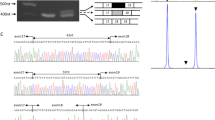Abstract
Ullrich congenital muscular dystrophy (UCMD) is a severe disorder caused, in most cases, by a deficiency in collagen VI microfibrils. Recessive mutations in two of the three collagen VI genes, COL6A2 and COL6A3, have been identified in eight of the nine UCMD patients reported thus far. A heterozygous COL6A1 gene deletion, resulting in a mutant protein that exerts a dominant negative effect, has recently been described in a severely affected UCMD patient. Here we describe a patient in whom reverse transcription-PCR analysis of fibroblast RNA suggested a heterozygous in-frame deletion of exon 13 in the triple-helical domain of COL6A2, which is predicted to be dominantly acting. However, a homozygous A→G mutation at −10 of intron 12 was found in the genomic DNA. The intron mutation activated numerous cryptic splice acceptor sites, generating normal and exon 13-deleted COL6A2 mRNA, and multiple aberrant transcripts containing frameshifts that were degraded through a nonsense-mediated decay mechanism. Northern analysis indicated diminished COL6A2 mRNA expression as the primary pathogenic mechanism in this UCMD patient. Our results underscore the importance of multifaceted analyses in the accurate molecular diagnosis and interpretation of genotype-phenotype correlations of UCMD.


Similar content being viewed by others
References
Bateman JF, Freddi S, Lamande SR, Byers P, Nasioulas S, Douglas J, Otway R, Kohonen-Corish M, Edkins E, Forrest S (1999) Reliable and sensitive detection of premature termination mutations using a protein truncation test designed to overcome problems of nonsense-mediated mRNA instability. Hum Mutat 13:311–317
Bertini E, Pepe G (2002) Collagen type VI and related disorders: Bethlem myopathy and Ullrich scleroatonic muscular dystrophy. Eur J Paediatr Neurol 6:193–198
Camacho Vanegas O, Bertini E, Zhang RZ, Petrini S, Minosse C, Sabatelli P, Giusti B, Chu ML, Pepe G (2001) Ullrich scleroatonic muscular dystrophy is caused by recessive mutations in collagen type VI. Proc Natl Acad Sci USA 98:7516–7521
Demir E, Sabatelli P, Allamand V, Ferreiro A, Moghadaszadeh B, Makrelouf M, Topaloglu H, Echenne B, Merlini L, Guicheney P (2002) Mutations in COL6A3 cause severe and mild phenotypes of Ullrich congenital muscular dystrophy. Am J Hum Genet 70:1446–1458
Frischmeyer PA, Dietz HC (1999). Nonsense-mediated mRNA decay in health and disease. Hum Mol Genet 8:1893–1900
Higuchi I, Shiraishi T, Hashiguchi T, Suehara M, Niiyama T, Nakagawa M, Arimura K, Maruyama I, Osame M (2001) Frameshift mutation in the collagen VI gene causes Ullrich’s disease. Ann Neurol 50:261–265
Ishikawa H, Sugie K, Murayama K, Ito M, Minami N, Nishino I, Nonaka I (2002) Ullrich disease: collagen VI deficiency: EM suggests a new basis for muscular weakness. Neurology 59:920–923
Lampe AK, Dunn DM, Von Niederhausern AC, Hamil C, Aoyagi A, Laval SH, Chu ML, Swoboda K, Muntoni F, Bonnemann CG, Flanigan KM, Bushby KMD, Weiss RB (2005) Automated genomic sequence analysis of the three collagen VI genes: applications to Ullrich congenital muscular dystrophy and Bethlem myopathy. J Med Genet 42:108–120
Pan TC, Zhang RZ, Sudano DG, Marie SK, Bönnemann CG, Chu ML (2003) New molecular mechanism for Ullrich congenital muscular dystrophy: a heterozygous in-frame deletion in the COL6A1 gene causes a severe phenotype. Am J Hum Genet 73:355–369
Shapiro MB, Senapathy P (1987) RNA splice junctions of different classes of eukaryotes: sequence statistics and functional implications in gene expression. Nucleic Acids Res 15:7155–7174
Specks U, Mayer U, Nischt R, Spissinger T, Mann K, Timpl R, Engel J, Chu ML (1992) Structure of recombinant N-terminal globule of type VI collagen alpha 3 chain and its binding to heparin and hyaluronan. EMBO J 11:4281–4290
Tillet E, Wiedemann H, Golbik R, Pan TC, Zhang RZ, Mann K, Chu ML, Timpl R (1994) Recombinant expression and structural and binding properties of alpha 1(VI) and alpha 2(VI) chains of human collagen type VI. Eur J Biochem 221:177–185
Timpl R, Chu ML (1994) Microfibrillar collagen type VI. In: Yurchenoco PD, Birk DE, Mecham RP (eds) Extracellular matrix assembly and structure. Academic, New York, pp 207–242
Zhang MQ (1998) Statistical features of human exons and their flanking regions. Hum Mol Genet 7:919–932
Acknowledgements
We thank the patient and his family for their participation in this study. The work was supported by NIH grant AR38912 to MLC, and MIUR subcontract grant FIRB N.RBNE01JJ45_005 to GP. The NSCAG support to the diagnostic work of the Dubowitz Neuromuscular center is also acknowledged.
Author information
Authors and Affiliations
Corresponding author
Rights and permissions
About this article
Cite this article
Lucarini, L., Giusti, B., Zhang, RZ. et al. A homozygous COL6A2 intron mutation causes in-frame triple-helical deletion and nonsense-mediated mRNA decay in a patient with Ullrich congenital muscular dystrophy. Hum Genet 117, 460–466 (2005). https://doi.org/10.1007/s00439-005-1318-8
Received:
Accepted:
Published:
Issue Date:
DOI: https://doi.org/10.1007/s00439-005-1318-8




